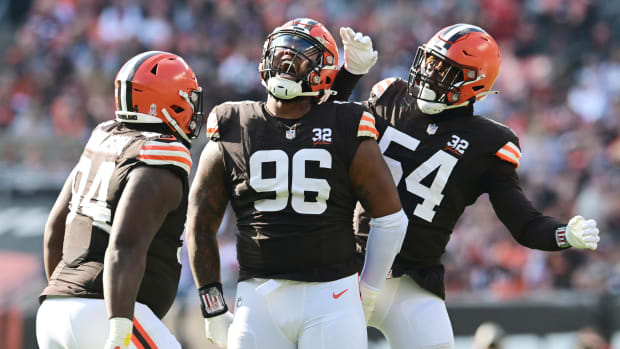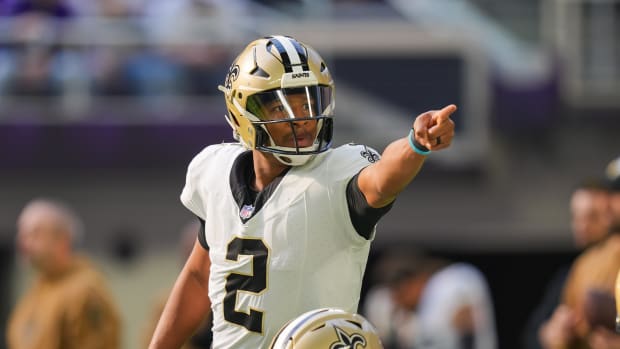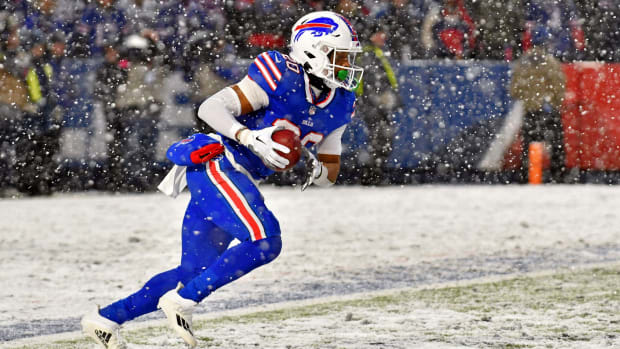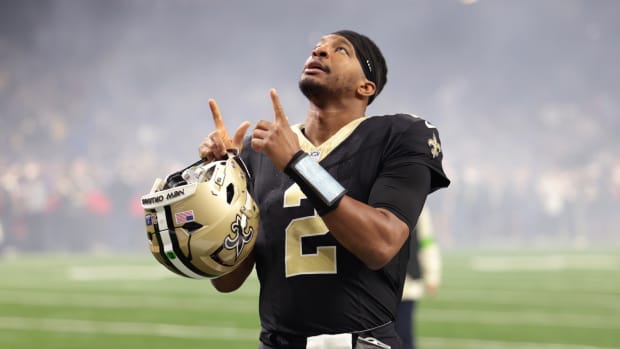Unsolicited Advice For David Njoku
Given the chance to ask Cleveland Browns tight end David Njoku one question, it'd be pretty simple. "Who is going to vouch for you that will make a team want to trade for you?"
Njoku switched his agent, hiring Drew Rosenhaus, who promptly told the Browns that his client wanted to be traded. After explaining the thought process behind that decision, the next step is providing the advice that Njoku should be getting rather than simply telling him what he wants to hear.
After three seasons with the Browns, for all the talent and promise he has, it's difficult to come up with anyone that would tell teams they should want to trade for Njoku. The best stretch of his career was with Gregg Williams as interim head coach and Freddie Kitchens as offensive coordinator. The same Kitchens who became the head coach the following year and basically moved on from Njoku after he came back from injury.
Andrew Berry clearly believes in Njoku. Involved in drafting him in 2017, Berry picked up his fifth-year option without hesitation and hopes to have him as a member of the Browns beyond 2021. Berry is the one person who has consistently backed Njoku in the NFL and he responds by requesting a trade. Even if Berry were to give Njoku glowing reviews to teams, they'd have to give up enough to get him, which isn't likely to happen.
Kevin Stefanski is a fan of what Njoku can be, thinks he can be a big factor in the offense, but rightly points out that Njoku must do his part.
So who else is there?
David Njoku has the talent to be a great player, but when he seemed primed to become the player the Browns envisioned when he was drafted, he suffered a lost year. And 2019 can't totally be blamed on the time missed due to the wrist injury. Njoku didn't do his part when he came back from the broken scaphoid and that led to friction with the head coach. Even accepting that Kitchens was a terrible hire and completely ill equipped to do the job, Njoku did not do himself any favors.
Demanding a trade when his value can't really be much lower and the team that drafted him ensured he will make over $6 million in 2021 shows a complete lack of self awareness. And he can't hide behind Rosenhaus, especially when the trade demand came almost immediately after he was hired. The agent acts at the behest of his client. So while Rosenhaus will absorb some of the negative attention that would go to Njoku, none of this happens unless that's what Njoku wants.
The best thing Njoku can do right now is simply focus on this year and his own development as much as possible, both from a football perspective as well as his maturity. If he does that, the rest will take care of itself. As is too often the case when trying to catch passes, Njoku takes his eye off the ball, worrying about what's next and the result is disappointing.
Njoku is going to get a little over $3 million this season and over $6 million in 2021, whether it's with the Browns or somewhere else. That should provide him the freedom to avoid worrying about what's next, only focusing on what he can do today, but he needs to embrace it.
The reason it doesn't is because the fifth-year option is tied to playing time and production per the new collective bargaining agreement. In other words, the Browns would save some money if Njoku can't meet those goals and he'd earn less.
Njoku wants it all, understandably, but demanding a trade in an effort to secure money in 2021 is still shortsighted. If Njoku builds himself into a great player, he'll earn the full amount and set himself up for the lucrative second contract he wants.
Whether he realizes it or not, even as a second tight end in this offense, he could end up with every dollar he's hoping for from the Browns. Limiting his potential market is unnecessary. If Njoku is the player the Browns hope he can be, it would not be surprising at all for them to start negotiating an extension after this season.
Austin Hooper isn't a threat. If anything, Hooper only take pressure off of Njoku so he can have the best season of his career. The Browns are going to run a ton of double tight end sets and whoever the opponent puts on Hooper is likely their best defender against a tight end. Njoku will have a much easier time to operate, both as a blocker and pass catcher.
It's also taking the same limited view of the league that so many took upon seeing the news that the Browns signed Hooper and then again when they drafted Harrison Bryant. Wrongly believing tight end is really just a one player position and ignoring the fact that the Browns offense plans to utilize two as a significant part of the offense. Hooper and Njoku can make it incredibly difficult for the offense to take either of them off the field because of the matchup issues they cause, both for themselves as well as teammates.
Whether it's tight end or discussing the potential role of Kareem Hunt, the Browns are focused on putting their best 11 on the field. Njoku can do his part to make sure he's consistently in that top 11 and produce as a result, giving the Browns an offensive dynamic that is incredibly difficult to defend.
It's also important for Njoku to realize what he has in Baker Mayfield at quarterback. Yes, a late Mayfield throw helped to cause the injury last year, but the Browns signal caller has always targeted the tight end position. Whether it was at Oklahoma or in his first two seasons with the Browns, he likes to work the middle of the field and particularly likes bigger bodies in the red zone.
Kyle Rudolph and Irv Smith each had a little over 300 yards and combined for eight touchdowns. Perhaps Njoku is looking at Irv Smith's production and is worried what that would mean for him. It's up to Njoku to prove he's better than Smith, which is something he should be able to achieve.
Whatever raw statistics Njoku might lose in terms of targets, he should more than make up with his efficiency, which is the improvement he needs the most. Drops in particular have held him back. If he can simply limit those, his production would increase and garner him more opportunities.
If Njoku looks at Smith's efficiency in Minnesota, that would be something for Njoku to aspire. Targeted 47 times, Smith caught 76.5 percent of them at 6.6 yards per target. For his career, Njoku averages 6.7 yards per target, but he's only catching 58.8 percent of targets.
The upside for Njoku is he's averaging 11.8 yards per reception compared to Smith's 8.6. If Njoku had converted 76.5 percent of his targets in the first 36 games of his career, he would've caught another 27 passes for 318 yards. Just improving his efficiency would add more production than Smith's entire rookie season.
Better coaching should help improve the looks Njoku gets, but unless he becomes more consistent, he may never be an efficient receiving threat. It's that lack of efficiency, not the Browns which is preventing Njoku from becoming the player he wants to be, potentially limiting his market in 2022.
His sole focus should be keeping his eye on the ball and securing the catch rather than worrying about what happens afterward or two years down the road. None of that means Njoku won't want to play elsewhere, which is his right, but this is about serving his best interest now.
This trade demand is likely to be a humbling experience for Njoku and if he presses it, it's only going to be worse. How he processes the disappointment could be critical in where his career goes from here. If he uses it as fuel to make himself a better player and person, it could prove a positive turning point. However, if he can't own his own shortcomings and responds immaturely, it could be the latest example what might limit him from being a great player.
David Njoku is the only one who can determine how good he will be, regardless of what uniform he's wearing.




